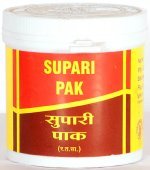Nud, Nuḍ, Nuṭ, Ṇuṭ, Ṅuṭ, Nut: 14 definitions
Introduction:
Nud means something in Hinduism, Sanskrit. If you want to know the exact meaning, history, etymology or English translation of this term then check out the descriptions on this page. Add your comment or reference to a book if you want to contribute to this summary article.
Images (photo gallery)
In Hinduism
Vyakarana (Sanskrit grammar)
Source: Wikisource: A dictionary of Sanskrit grammarṄuṭ (ङुट्).—Augment ङ् (ṅ) mentioned as ङुठ् (ṅuṭh), in Kasika, added to the vowel following the consonant ङ् (ṅ) at the end of a word. See ङमुट् (ṅamuṭ).
--- OR ---
Ṇuṭ (णुट्).—Augment ण् (ṇ), prefixed to the initial vowel when it follows upon the consonant ण् (ṇ) at the end of the preceding word; e. g. सुगण्णीशः (sugaṇṇīśaḥ) for सुगण् (sugaṇ) + ईशः (īśaḥ) cf P. VIII. 3.82.
--- OR ---
Nuṭ (नुट्).—Augment न् (n) prefixed (l) to the gen. pl. ending in आम् (ām) after a crude base ending in a short vowel, or in ई (ī) or ऊ (ū) of feminine bases termed nadi, or in आ (ā) of the feminine affix (टाप् डाप् (ṭāp ḍāp) or चाप् (cāp)); e g. वृक्षाणाम्, अग्नीनाम्, कर्तॄणाम्, कुमारीणाम्, मालानाम् (vṛkṣāṇām, agnīnām, kartṝṇām, kumārīṇām, mālānām) etc.; cf. P. VII.1.54; (2) to the affix आम् (ām) after numerals termed षट् (ṣaṭ) and the numeral चतुर् (catur) as also after the words श्री, ग्रामणी (śrī, grāmaṇī) and गो (go) in Vedic Literature, e. g. षण्णाम्, पञ्चानाम्, चतुर्णाम्, श्रीणाम्, ग्रामणीनाम्, गोनाम् (ṣaṇṇām, pañcānām, caturṇām, śrīṇām, grāmaṇīnām, gonām); cf. P. VII.1.55,56, 57; (3) to the part of a root possessed of two consonants, as also of the root अश् (aś) of the fifth conjugation after the reduplicative syllable ending in आ (ā), which is substituted for अ; e.g. आनञ्ज, व्यानशे (ānañja, vyānaśe); cf. P.VII.4. 71,72; (4) to the affix मतुप् (matup) after a base ending in अन् (an) as also to the affixes तरप् (tarap) and तमप् (tamap) after a base ending in न् (n) in Vedic Literature, e.g. मूर्धन्वती, अक्षण्वन्तः, सुपथिन्तरः (mūrdhanvatī, akṣaṇvantaḥ, supathintaraḥ) etc.;cf. P. VIII. 2.16, 17: (5) to the initial vowel of the second member of a compound having अ (a) of नञ् (nañ) as the first member; e. g. अनघः (anaghaḥ), cf. P.VI. 3.74; (6) to any vowel after न् (n) which is preceded by a short vowel and which is at the end of a word e.g. कुर्वन्नास्ते (kurvannāste), cf. P. VIII. 3.32.

Vyakarana (व्याकरण, vyākaraṇa) refers to Sanskrit grammar and represents one of the six additional sciences (vedanga) to be studied along with the Vedas. Vyakarana concerns itself with the rules of Sanskrit grammar and linguistic analysis in order to establish the correct context of words and sentences.
Languages of India and abroad
Sanskrit dictionary
Source: DDSA: The practical Sanskrit-English dictionaryNuḍ (नुड्).—6 P. (nuḍati) To hurt, kill.
--- OR ---
Nud (नुद्).—6 U. (nudati-te, nutta or nunna, praṇudati)
1) To push, push or drive on, impel, propel; मन्दं मन्दं नुदति पवनश्चानु- कूलो यथा त्वाम् (mandaṃ mandaṃ nudati pavanaścānu- kūlo yathā tvām) Meghadūta 9; Uttararāmacarita 5.1.
2) To prompt, incite, urge on; रथचरणसमाह्वस्तावदौत्सुक्यनुन्ना (rathacaraṇasamāhvastāvadautsukyanunnā) Śiśupālavadha 11.26; Kumārasambhava 6.65.
3) To remove, drive away, cast away, dispel; अदस्त्वया नुन्नमनुत्तमं तमः (adastvayā nunnamanuttamaṃ tamaḥ) Śiśupālavadha 1.27; केयूरबन्धोच्छ्वसितैर्नुनोद (keyūrabandhocchvasitairnunoda) R.6.68; 8.4;16.85; Kirātārjunīya 3.33;5.28.
4) To throw, cast, send.
5) Ved. To raise, lift up. -Caus.
1) To remove, drive away.
2) To prompt, incite, push on or urge forward. -With उप (upa) to drive away, remove; Śiśupālavadha 4.61.
-pra° to dispel, drive off, remove; नयनप्रसरप्रणुन्नमिव वारिरुहम् (nayanaprasarapraṇunnamiva vāriruham) Śiśupālavadha 9.71.
Source: Cologne Digital Sanskrit Dictionaries: Shabda-Sagara Sanskrit-English DictionaryṆud (णुद्).—[ṇuda] r. 6th cl. (au) auṇuda (nunati nudate) 1. To cast, to command, to direct, to throw or send; the act of ordering being considered analogous to that of throwing. 2. To go or proceed. With apa, To remove. With nir 1. To throw out. 2. To confess, to acknowledge. With vi, To be happy. With saṃ in the causal, To drive, (as horses.)
--- OR ---
Nuḍ (नुड्).—[nuḍa] r. 9th cl. (nuḍati) To hurt or kill. tu-ku-para-saka-seṭ .
Source: Cologne Digital Sanskrit Dictionaries: Benfey Sanskrit-English DictionaryNuḍ (नुड्).— i. 6, [Parasmaipada.] To kill.
--- OR ---
Nud (नुद्).— i. 6, [Parasmaipada.], [Ātmanepada.] (ii. 2, [Harivaṃśa, (ed. Calc.)] 7442). 1. To push on, [Meghadūta, (ed. Gildemeister.)] 9. 2. To push away, to remove, Mahābhārata 3, 12707; 4, 1819. Ptcple. of the pf. pass. nutta, nunna, nūta and in epic poetry also nudita Mahābhārata 1, 6670. [Causal.] nodaya 1. To push on, Mahābhārata 9, 1005. 2. To incite, [Rāmāyaṇa] 5, 46, 12.
— With the prep. apa apa 1. To drive away, [Bhāgavata-Purāṇa, (ed. Burnouf.)] 1, 16, 35. 2. To remove, Mahābhārata 14, 1853.
— With vyapa vi-apa To remove, 11, 24.
— With abhi abhi To strike, 14, 1718. [Causal.] To order, 1478.
— With ava ava [Causal.] 1. To induce to drive away (two acc.), 7, 3069.
— With apā apa-ā (probably apa with lengthened final), 1. To drive away, 7, 8691. 2. To remove, 3, 16973. 3. To expiate, [Mānavadharmaśāstra] 6, 95.
— With vyapā vi-apa-ā (see apā), To remove, Mahābhārata 4, 1319.
— With upā upa-ā (?), 1. To drive away, 7, 1771. 2. To remove, 268. 3. To bruise, 6, 5619.
— With upa upa To drive near, [Śiśupālavadha] 4, 68.
— With nis nis nirṇud nir ṇud 1. To reject, [Mānavadharmaśāstra] 4, 250. 2. To remove, Mahābhārata 12, 7126.
— With abhinis To remove, 12, 10728.
— With parā parā ṇud ṇud To remove, [Bhāgavata-Purāṇa, (ed. Burnouf.)] 3, 7, 7.
— With pra pra ṇud ṇud 1. To drive away, Mahābhārata 4, 1660. 2. To remove, [Rāmāyaṇa] 3, 78, 8. 3. To push on, Mahābhārata 3, 12096. 4. To stir, [Rāmāyaṇa] 5, 3, 38. [Causal.] pra- ṇodita Agitated, [Pañcatantra] 165, 10.
— With atipra ati-pra To press hard, [Daśakumāracarita] in
— With anupra anu-pra To put to flight, [Rāmāyaṇa] 6, 7, 36.
— With saṃpra sam-pra 1. To urge, Mahābhārata 3, 377. 2. To remove, 5, 745.
— With vi vi 1. To strike, to wound, 6, 4846. 2. To play (as a guitar), [Bhāgavata-Purāṇa, (ed. Burnouf.)] 4, 8, 38. [Causal.] 1. To remove, [Śiśupālavadha] 4, 60. 2. To spend (as a night), Mahābhārata 3 46. 3. To exhilarate, Böhtl. Ind. Spr. 135.
— With abhavi abhi-vi [Causal.] To exhilarate, Mahābhārata 12, 898.
— With sam sam 1. To collect, 6, 777. 2. To push on, [Nala] 20, 42. 3. To find, [Rāmāyaṇa] 5, 1, 92.
— Cf. A. S. nydian (to compel), a-nydan (to repel); [Gothic.] niutan, A. S. niótan (originally, to further), not, use, perhaps
--- OR ---
Nud (नुद्).—[-nud], latter part of a comp. adj., Removing, [Kirātārjunīya] 5, 28.
Source: Cologne Digital Sanskrit Dictionaries: Cappeller Sanskrit-English DictionaryNud (नुद्).—1. nudati nudate [participle] nutta & nunna push, thrust; impel, incite; expel, drive away, remove, reject. [Causative] nodayati impel. [Intensive] nonudyate drive away repeatedly, chase.
--- OR ---
Nud (नुद्).—2. (—°) chasing, removing.
Source: Cologne Digital Sanskrit Dictionaries: Monier-Williams Sanskrit-English Dictionary1) Nuḍ (नुड्):—[class] 6. [Parasmaipada] nuḍati, to hurt, strike, kill, [Dhātupāṭha xxviii, 92] ([Vopadeva])
2) Nud (नुद्):—1. nud [class] 6. [Ātmanepada] [Parasmaipada] ([Dhātupāṭha xxviii, 2; 132]) nudati, te ([perfect tense] nunoda, [Kāvya literature]; nunude, 3. [plural] dre, [Ṛg-veda] etc.; [Aorist] [Parasmaipada] anautsīt [grammar]; [Ātmanepada] anutthās, [Ṛg-veda]; nudiṣṭhās, [Atharva-veda]; Prec. -nudyāt, [Bhagavad-gītā]; [future] -notsyati, [Mahābhārata]; te, [Brāhmaṇa] etc.; nottā [grammar]; [indeclinable participle] -nudya, [Śāṅkhāyana-gṛhya-sūtra]; [infinitive mood] -nude, [Ṛg-veda]; -nudas, [Kāṭhaka]; -nodam, [Ṛg-veda]),
2) —to push, thrust, impel, move, remove, [Ṛg-veda] etc. etc.:—[Causal] nodayati ([Passive voice] nodyate), to push on, urge, incite, [Upaniṣad; Mahābhārata; Kāvya literature] etc.:—[Intensive] nonudyate, to push or drive away repeatedly, [Aitareya-brāhmaṇa]
3) 2. nud mfn. pushing, impelling, driving away, removing, [Upaniṣad; Mahābhārata; Kāvya literature etc.] (ifc. or with [accusative])
Source: Cologne Digital Sanskrit Dictionaries: Yates Sanskrit-English Dictionary1) Ṇud (णुद्):—[(śa-au) nudati] 6. a. To cast, to command. With apa to remove; with nir to throw out; to confess; with pra to follow; with vi to be happy; with saṃ to drive.
2) Nuḍ (नुड्):—nuḍati 1. 6. a. To hurt.
Source: DDSA: Paia-sadda-mahannavo; a comprehensive Prakrit Hindi dictionary (S)Nud (नुद्) in the Sanskrit language is related to the Prakrit word: Ṇolla.
[Sanskrit to German]
Sanskrit, also spelled संस्कृतम् (saṃskṛtam), is an ancient language of India commonly seen as the grandmother of the Indo-European language family (even English!). Closely allied with Prakrit and Pali, Sanskrit is more exhaustive in both grammar and terms and has the most extensive collection of literature in the world, greatly surpassing its sister-languages Greek and Latin.
See also (Relevant definitions)
Starts with (+51): Nuda, Nudaka, Nudalei, Nudantaka, Nudati, Nudi, Nudidappu, Nudidodu, Nudiga, Nudigabba, Nudigal, Nudigali, Nudigalisu, Nudigannu, Nudigara, Nudigarike, Nudigattu, Nudigedu, Nudigeduga, Nudigel.
Ends with (+19): Abhinirnud, Abhinud, Abhivinud, Anud, Anupranud, Apanud, Aratinud, Asrapittanud, Atinud, Atipranud, Dahanud, Garbhanud, Jatharanud, Kaphanud, Kaphapranud, Kriminud, Krimipranud, Nirnud, Paranud, Parinud.
Full-text (+1766): Bhallataka, Tambula, Pranud, Puga, Tamonud, Narikera, Jatharanud, Cikkana, Darana, Akota, Jhoda, Kramuka, Guvaka, Atipranud, Parinud, Shirahphala, Ambuprasada, Nirnud, Pranunna, Vranakrit.
Relevant text
Search found 138 books and stories containing Nud, Ṇud, Nuḍ, Nuṭ, Ṇuṭ, Ṅuṭ, Nut; (plurals include: Nuds, Ṇuds, Nuḍs, Nuṭs, Ṇuṭs, Ṅuṭs, Nuts). You can also click to the full overview containing English textual excerpts. Below are direct links for the most relevant articles:
Vakyapadiya of Bhartrihari (by K. A. Subramania Iyer)
Verse 2.167 < [Book 2 - Vākya-kāṇḍa]
Kathasaritsagara (the Ocean of Story) (by Somadeva)
Part 12 - Southern China < [Appendix 8.2 - The Romance of Betel-Chewing]
Part 19 - The Solomon Islands < [Appendix 8.2 - The Romance of Betel-Chewing]
Part 11 - Philippine Islands < [Appendix 8.2 - The Romance of Betel-Chewing]
Charaka Samhita (English translation) (by Shree Gulabkunverba Ayurvedic Society)
Chapter 1b - The Urge to Live (prana-kama) < [Cikitsasthana (Cikitsa Sthana) — Section on Therapeutics]
Chapter 12 - The remaining best kinds of Enema (uttara-basti-siddhi) < [Siddhisthana (Siddhi Sthana) — Section on Successful Treatment]
Chapter 3 - The Principles of the Enema Procedure (basti-sutra-sddhi) < [Siddhisthana (Siddhi Sthana) — Section on Successful Treatment]
Chaitanya Bhagavata (by Bhumipati Dāsa)
Verse 1.11.3-4 < [Chapter 11 - Meeting with Śrī Īśvara Purī]
Verse 2.9.103 < [Chapter 9 - The Lord’s Twenty-One Hour Ecstasy and Descriptions of Śrīdhara and Other Devotees’ Characteristics]
Verse 3.6.17 < [Chapter 6 - The Glories of Śrī Nityānanda Prabhu]
Manusmriti with the Commentary of Medhatithi (by Ganganatha Jha)
Verse 6.17 < [Section III - Details of the Hermit’s Life]
Verse 8.322 < [Section XLIII - Theft (steya)]
Verse 5.64 < [Section IX - Other forms of Impurity]
Cosmetics, Costumes and Ornaments in Ancient India (by Remadevi. O.)
2.3. Pharmaceutical use of Tāmbūla (Betel) < [Chapter 1 - Cosmetics]
1.2. Materials (d): Marakata (Emerald) < [Chapter 3 - Ornaments]
2.7. Pharmaceutical use of Keśarāga (Hair dye) < [Chapter 1 - Cosmetics]
Related products
(+27 more products available)









